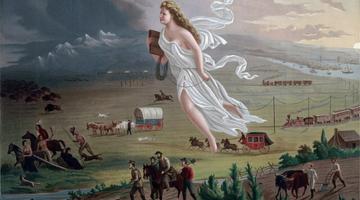Young men in Niger meet at fadas to figure out what to do with their lives under uncaring global capitalism.
“High unemployment and intensifying informalization are no longer specific to the Global South.”
In this series, we ask acclaimed authors to answer five questions about their book. This week’s featured author is Adeline Marie Masquelier. Masquelier is Professor of Anthropology at Tulane University. Her book is Fada: Boredom and Belonging in Niger.
Roberto Sirvent: How can your book help BAR readers understand the current political and social climate?
Adeline Masquelier: In the wake of the devastation wrought by the loss of jobs in the post-Fordist era, there is an urgent need to document what happens to people whose labor has been rendered irrelevant to the needs of global capital. How do people cope when they are cast aside—displaced from an increasingly competitive marketplace—and when the futures they once contemplated are now overwhelmed by the urgency of the present? Though Nigeriens never experienced Fordist labor and consumption regimes—the industrial sector is still in its infancy—I argue in my book that there are lessons to be learned from places long considered irrelevant to the centers of power and capitalist production. In Niger young men unable to secure decent livelihoods have created social spaces, which they call fadas, for coping with disenfranchisement and boredom. The conditions to which the fadas are a response—persistently high unemployment, intensifying informalization, and so on—are no longer specific to the Global South. By addressing existential predicaments—notably the sense of deprivation and dislocation experienced by the unemployed (or the underemployed) and the loss of a predictable future—that are pervasive and chronic, my book elucidates some of the mechanisms through which people recreate a sense of stability in the face of precarity.
What do you hope activists and community organizers will take away from reading your book?
My book is broadly concerned with the ethics of street life. I challenge the notion of “stuck youth” by documenting how the fadas where young men meet to drink tea, talk, and socialize are places of experimentation, social laboratories where skills are honed and selfhoods are crafted. The landscape of fadas is heterogenous, shifting, and highly attuned to emerging trends. What this means is that while some fadas are simply tea-circles, others are more coordinated organizations shaped by specific agendas. Some young men are politicized, others have turned their fadas into de facto NGOs, yet others engage in activities that test the limit of the licit and the legal. Regardless of what they stand for, fadas constitute a terrific source of human potential which has been largely untapped.
We know readers will learn a lot from your book, but what do you hope readers will un-learn? In other words, is there a particular ideology you’re hoping to dismantle?
Waiting is often understood to be a “gap,” an interruption between events anticipated in a structure of events. This is misleading. I argue in the book that far from being a space where nothing happens (and is therefore uninteresting), waiting is often a critical path to the unfolding of possible futures. Put differently, waiting may be a suspension of time but it is rarely a suspension of activity. To be sure, fadas are spaces for dreaming the good life in contexts where these dreams have become unrealizable. Yet while they wait for jobs that may never materialize, young men are not inactive. The poor and the unemployed are often perceived to be “lazy” and stagnant.” I complicate the unflattering stereotypes that circulate about tea-sipping young men and describe them as engaged, aspired, often busy young men. At the fada, waiting often turns out to be tactical, marked by improvisation, pragmatism, and frequent goal recalibration. For instance, many young men keep watch on the neighborhood while everyone else sleeps. By deploying their social immobility—the fact that they have nowhere to go in the morning—into an asset, they transform the fadas into an instrument of nighttime surveillance.
Who are the intellectual heroes that inspire your work?
There are many scholars whose work has inspired my analysis of young men’s sociality in urban Niger. Since the book is concerned with the forms of belonging that young men carve out for themselves, I should perhaps recognize Asef Bayat, Michel de Certeau, Henri Lefebvre, Doreen Massey, AbdouMaliq Simone, and Ato Quayson for their contributions. These theorists have provided important tools for how to think about the myriad, often ingenious ways that urban space is used, inhabited, and transformed by ordinary people. Nevertheless the real heroes here are the young men who invited me to sit in their fadas and often turned out to be unfailing sources of wisdom and good sense.
In what way does your book help us imagine new worlds?
I have analyzed fadas as spaces of “the possible” where people dream of a better life, stuff happens, and time unfolds in a pleasurable—rather than burdensome—fashion. This does not mean that the coping strategies young men engage in necessarily produce desired outcomes. Rather, what it means is that we must take seriously our interlocutor’s aspirations. This book signals my commitment to giving these aspirational dimensions a place in my analysis. Ideals should not be ignored simply because they are out of reach, for they stir imagination and give people the nerve to be ambitious, to take risks. From such a perspective, disenfranchised young men in the streets of Niamey, Niger’s capital, can be reduced neither to victims nor to thugs. Instead they are striving subjects who experiment, aspire, make mistakes, but never stop dreaming.
Roberto Sirvent is Professor of Political and Social Ethics at Hope International University in Fullerton, CA. He also serves as the Outreach and Mentoring Coordinator for the Political Theology Network. He is co-author, with fellow BAR contributor Danny Haiphong, of the new book, American Exceptionalism and American Innocence: A People’s History of Fake News—From the Revolutionary War to the War on Terror.
COMMENTS?
Please join the conversation on Black Agenda Report's Facebook page at http://facebook.com/blackagendareport
Or, you can comment by emailing us at comments@blackagendareport.com



















